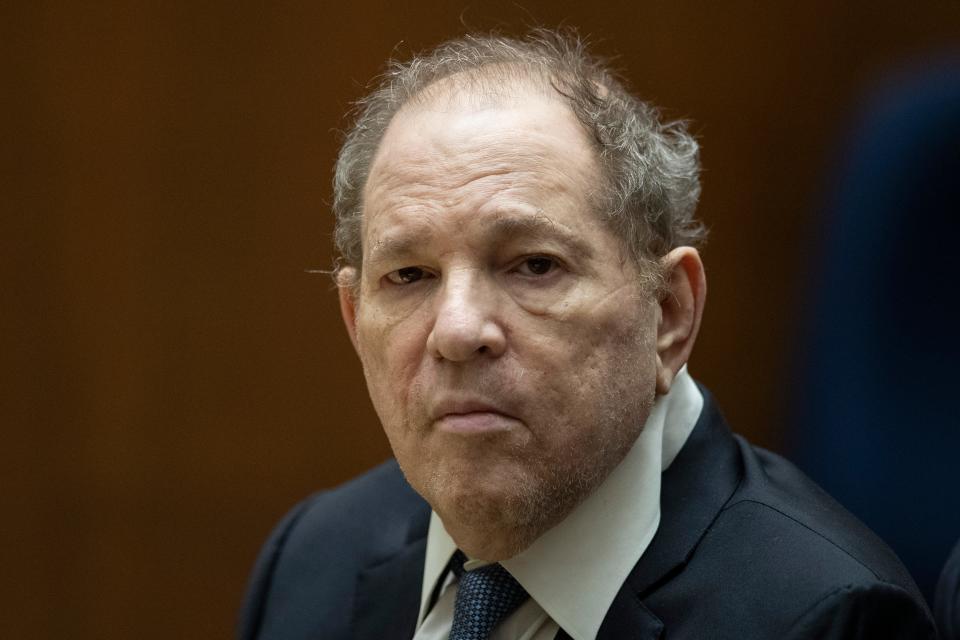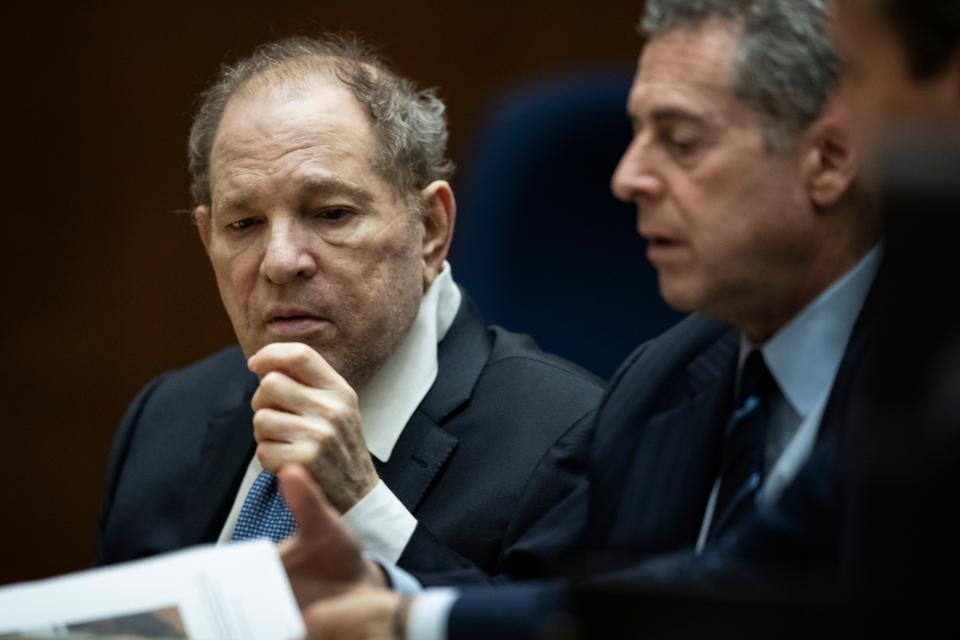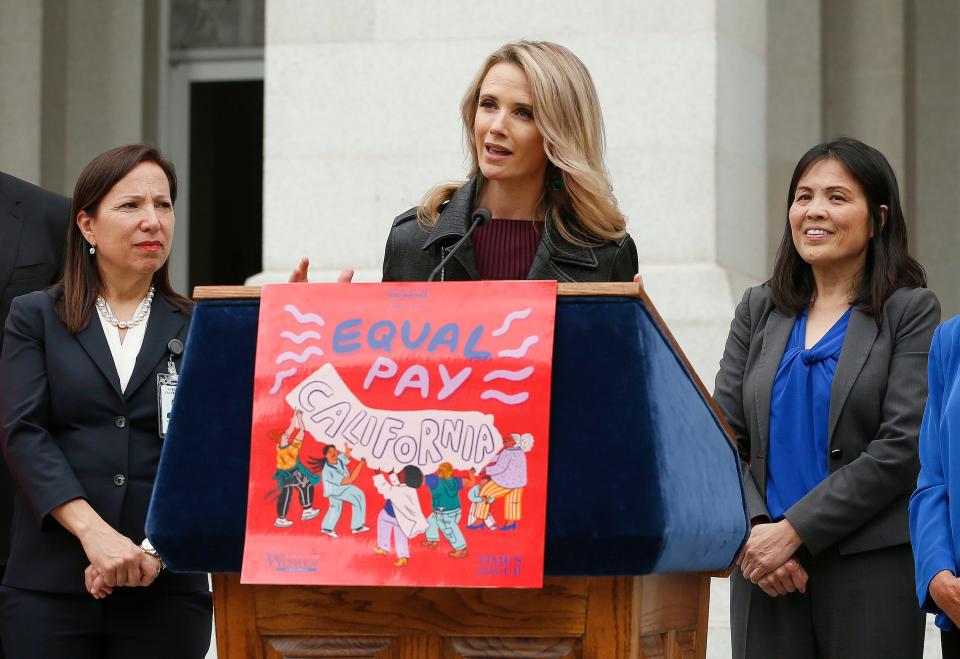The People vs Harvey Weinstein, Part 2: Why is the disgraced movie mogul on trial again?
- Oops!Something went wrong.Please try again later.
- Oops!Something went wrong.Please try again later.
Harvey Weinstein's second criminal trial is underway in the city where he once ruled the movie industry and now resides in a jail cell.
Opening statements began Monday followed by testimony from an accuser Tuesday who says she felt "guilty" after she let him into her hotel room and he allegedly raped her.
Prosecution and defense teams have spent the last two weeks picking a jury of nine men and three women for a trial expected to last until around Thanksgiving, although Judge Lisa Lench has said there will be some days off in the interim. If convicted in Los Angeles, the mogul-turned-convicted sex offender faces up to 135 years in prison, prosecutors have said.
Here's what to know about The People vs. Harvey Weinstein, Part Two:
Where is Harvey Weinstein now?
It's been five years since Weinstein, 70, became the face of the #MeToo movement to call out sexual violence through public accusations of misconduct against celebrity men.
It's been more than two years since Weinstein was convicted of two crimes – sexual assault and third-degree rape – in New York, becoming the first, and so far, the only major #MeToo figure to be judged guilty by a jury.
It's been more than a year since Weinstein was extradited to Los Angeles County from the New York prison where he was serving a 23-year sentence. He's been in a county jail ever since awaiting a new trial, facing more accusers and more (but similar) charges of rape and sexual assault.

And it's been two months since the New York state high court, in a surprise move, agreed to hear his appeal of his conviction, raising at least the possibility that it might be overturned next year.
Even if he is convicted in LA, and assuming the New York conviction is confirmed, Weinstein is likely to die in the prison near Buffalo where he was incarcerated, given his age and general bad health.
Weinstein denies all the charges and has insisted his encounters with accusers were consensual. He did not take the stand in New York; it's not clear yet whether he will in Los Angeles.
What does Weinstein face in his Los Angeles trial?
He is charged with 11 sex crimes, including rape and sexual assault, involving five women who accuse him of attacking them in Los Angeles and Beverly Hills hotels in encounters dating between 2004 to 2013.
In addition, prosecutors will seek to prove Weinstein followed an alleged pattern: Another four accusers are expected to testify that he attacked them, too, even though he is not charged with those alleged crimes.
The use of these "prior bad acts" witnesses is one aspect the Los Angeles and New York cases have in common, and is an issue Weinstein has raised on appeal. Such testimony is useful to prosecutors in sex-crime cases but requires judges to weigh the probative value against the prejudicial damage such testimony can pose.
"The judge in Los Angeles is very no-nonsense, she's allowed evidence more narrowly tailored than what was available in New York so the number of witnesses is fairly limited," says Elizabeth (Beth) Fegan, the lawyer who represents one of the five complaining accusers of Weinstein.
"There is a balance – you can’t have 50 women coming in and testifying; at some point it becomes a tidal wave," Fegan says. "The judge in California was very careful to allow the prosecution to use the (established) rules of evidence so (it won't be) an unfair trial."
Who are his accusers?
So far, their identities have been shielded and they are expected to testify either as Jane Does or by their first names and last initials. (They will be seen in open court but the trial is not being televised.)
Mark Werksman, one of Weinstein's defense team, said some of the accusers who will testify are well known. One of them will be Jennifer Siebel Newsom, wife of California Gov. Gavin Newsom, and a former actress and documentary filmmaker.
On the first day of jury selection on Oct. 10, Fegan, Siebel Newsom's lawyer, issued a statement to the media, including USA TODAY, acknowledging Newsom will testify as Jane Doe #4, who says Weinstein raped her nearly two decades ago.

"Like many other women, my client was sexually assaulted by Harvey Weinstein at a purported business meeting that turned out to be a trap," Fegan said in the statement. "She intends to testify at his trial in order to seek some measure of justice for survivors, and as part of her life's work to improve the lives of women."
On Monday, Judge Lench ruled that jurors will be allowed to hear that Siebel Newsom emailed Weinstein for advice about dealing with the media amid a sex scandal involving her then-boyfriend Newsom, two years after she says Weinstein raped her.
But the judge declined to allow the defense to include details about the contents of the email and the scandal over Newsom's affair with the wife of a close aide when he was mayor of San Francisco. Werksman argued adamantly it was crucial to Weinstein's rights that the context of the email be included.
"Of all things you'd think a woman that is raped by Harvey Weinstein wouldn't do, it's ask him how to deal with a sex scandal," Werksman told the judge. She responded the contents of the email were "too tangential in relation to this trial."
Will famous people testify at the trial?
The list of witnesses has been sealed but some names have been discussed in court. Aside from the wife of the state governor, the best known witness expected to testify is actor/director Mel Gibson, 66, who will testify about what he learned from one of Weinstein's five accusers.
Gibson will be testifying in support of his masseuse and friend, who will be known as Jane Doe #3 at the trial. Weinstein is accused of committing sexual battery by restraint against the woman after getting a massage from her in a Beverly Hills hotel in May of 2010.
Judge Lench said Gibson's testimony will depend on how the accuser describes the exchange with him when she takes the stand, and the judge may choose to rule against it at that time.
When were the L.A. charges filed against Weinstein?
Los Angeles prosecutors filed the first set of charges on Jan. 6, 2020, shortly after the first day of his New York trial ended. The case was put on hold until the New York trial concluded; later, Los Angeles prosecutors added more accusers and charges.
The coronavirus pandemic further delayed the case, as did Weinstein's efforts to avoid extradition, which he subsequently lost in the summer of 2021.
Why is a second trial of Weinstein necessary?
It's not, says Werksman, Weinstein's defense lawyer.
"With all the crime and difficult circumstances law enforcement is facing in Los Angeles, it's shocking that (prosecutors) are devoting time and resources in a completely unnecessary trial of baseless charges," Werksman says. "Some of the allegations never happened, they're made up whole cloth, and others were the result of consensual relations."
Still, this trial involves different crimes and accusers, separate from those in New York. Prosecutors typically argue that justice requires that accusers get their day in court – and in this case, especially in the homeland of the entertainment industry. The trial is as much about the accusers as it is about Weinstein, says V. James DeSimone, a Los Angeles-area lawyer in sexual harassment and abuse cases.
"The reason why this trial is going forward in Los Angeles is that these women deserve to be heard," says DeSimone. "We hear a lot about victims’ rights and this is an instance where the prosecutors are vindicating the rights of all of those individuals who have come forward."
There was no chance these Los Angeles charges would be dropped, says Emily D. Baker, a former Los Angeles prosecutor-turned-legal analyst with a YouTube channel and a podcast covering trials involving celebrity culture.
"You have different complaining witnesses, different events, and even if there are some things in common these are different jurisdictions and there are different state laws involved," Baker says.
After the #MeToo scandal first broke in the fall of 2017, former L.A. District Attorney Jackie Lacey set up a special task force to investigate and prosecute Hollywood figures accused of sex crimes. More than two years later, Weinstein was her first major target. Lacey was later voted out of office and her successor George Gascón took up the case.
"There has been a culture where sexual assault as crimes are not prioritized as they should be. I want to assure every victim in Los Angeles that holding sexual assailants accountable – no matter their power, wealth, or status – is a priority in my office," Gascón said in a statement to USA TODAY.
How does the pending N.Y. appeal figure in the L.A. case?
It makes the stakes for accusers and their lawyers, for prosecutors, for the #MeToo movement and for rape-prevention advocates that much higher: If he is convicted in Los Angeles, the thinking goes, then that's insurance in case the New York conviction is overturned or significantly undermined.
The possibility can't be discounted. After Bill Cosby's 2018 sexual assault conviction in Pennsylvania, no one thought that was in jeopardy, even after the state's Supreme Court accepted his appeal in a surprise move.
Thus, incredulity, rage and tears from Cosby's accusers greeted the Supreme Court's subsequent decision to overturn his conviction on constitutional grounds in June 2021, setting him free from prison after serving nearly three years of a 10-year sentence.
"The Cosby conviction being overturned, and now Harvey Weinstein having won a (chance) to challenge his conviction in New York, is a blow," said Caitlin Dulany, an actress who accused Weinstein of assaulting her in 1996. In a recent interview with Vulture, Dulany said she is not a witness but plans to attend the trial.
"There’s a lot at stake in the L.A. trial."
How likely is it the N.Y. conviction will be thrown out?
Weinstein's appeal of his New York conviction failed at first. In June, his conviction was upheld unanimously by a five-member state appellate court panel of judges who concluded his 2020 trial in Manhattan was fair, despite his lawyers' argument that prosecutors offered the jury potentially prejudicial testimony from accusers of uncharged crimes.
This was a surprise because at an earlier hearing on the matter, some of the judges on the panel raised questions about whether Manhattan prosecutors had piled on with “incredibly prejudicial” testimony from witnesses alleging uncharged crimes and that introducing evidence of Weinstein’s churlish past behavior amounted to overkill.

So it was another surprise when the New York Court of Appeal, as that state terms its highest-level court, decided to ignore the lower court's decision and accepted Weinstein's appeal. A final decision by the high court could be a year in the future.
What are some issues in play at the L.A. trial?
Pre-trial publicity and jury "contamination" during the trial is always an issue in a celebrity trial. It was especially the case in the Weinstein New York trial, which was a daily spectacle for nearly two months just prior to the pandemic.
One factor that could favor Weinstein is that the initial "intensity" of the #MeToo movement, and the media attention on it, has abated, says trial lawyer and former federal prosecutor Neama Rahmani.
"It has probably died down a little bit, which is better for Weinstein compared to where the movement stood years ago when he was (first) arrested and prosecuted," Rahmani says.
Baker thinks prosecutors might be worried about what jurors know about the recent civil defamation trial of Johnny Depp vs. Amber Heard, which involved allegations of sexual violence. The Virginia jury in that case found for Depp, suggesting they didn't believe Heard's accusations.
"If I'm the prosecutor I would want to know if the jury closely followed (that case)," says Baker. "If the Weinstein defense says that sometimes people lie about these things, they could be relying on the jury’s feelings about Heard."
A key issue will be the use of prosecution witnesses testifying about uncharged crimes, which was an issue during the New York trial (as well as Cosby's two trials). Prosecutors wanted to call up to 16 such witnesses; Judge Lench allowed five and one later dropped out.
"The difficulty with this issue is why these witnesses are not allowed in most criminal cases," Baker says. "They test the rules of evidence, about propriety and balance, about how many you can call and how far back they can go."
Another issue is the age of some of the allegations, which requires prosecutors to back up charges with contemporaneous evidence, such as the accuser confiding to someone about what she says happened to her.
"Sometimes memories fade and the jury will take that into account in terms of credibility and it can affect the outcome of the trial," Fegan says. "But survivors should not be precluded from attempting to claim these (allegations) because of an arbitrary statute of limitations cut off."
How much will the jury be told about what happened in the New York case?
"They're going to get the fact of conviction, not most of the details," says Baker. "The concern is that allowing them to know makes it easier for a jury to convict if they know of prior convictions. On the other hand they might also think we don't need to convict here if he's already convicted in New York."
Who else will testify besides accusers?
As in New York, there's likely to be conflicting testimony from experts on sex crimes and accuser behavior. Prosecution experts will try to explain to the jury the research about why accusers of sexual assault often don't or delay reporting to authorities.
Worksman said the defense will bring in behavior psychologists to testify about why women make "false reports" on sexual assault and how memories change over time based on external influences such as the #MeToo movement.
"The challenge the prosecution faces is the age of the charges," Baker says. "It's hard for jurors to wonder what's so urgent when (the alleged crime) is as far back as 2004." Baker says. "It's hard to understand the delay, the fear, the hesitancy."
Contributing: The Associated Press
This article originally appeared on USA TODAY: Harvey Weinstein's trial in LA: Who are his accusers? More to know

